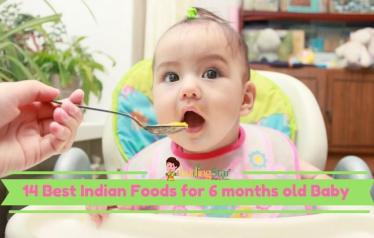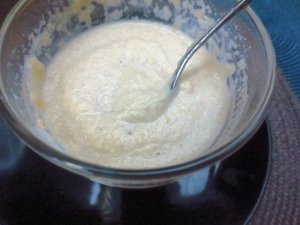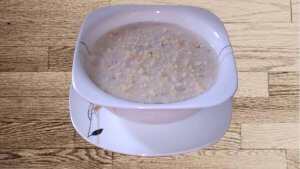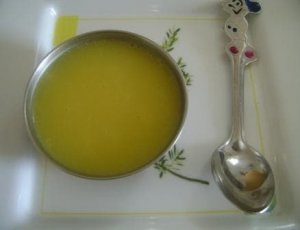“Every little spoonful of safe first foods for 6-month-old babies is a step towards growth, discovery, and nourishment.”
Congratulations Mommie! Your little bundle of joy turned 6 months old and now is the time to start your babies’ 6 month old baby food journey.
Introducing solid foods to a 6 month old baby in India is itself a festival. Every little one is different, some take to new flavors immediately, while others need a little extra time to adjust. As a parent, you must capture that adorable and special moment when your little ones start making expressions after the very first bite as these are moments to treasure forever.
Parents often eagerly await this milestone, but figuring out what can be the best homemade baby foods for 6 month olds can be confusing.
But fret not, Budding Star brings you an easy-to-follow Indian baby food chart for 6 months old babies. This blog also offers helpful tips to make the journey of nutritious first foods for Indian babies at 6 months both smooth and enjoyable.
Solid Foods that Are Best For a 6-Month-Old
Many, many congratulations on your baby completing 6 months in this world. Congratulations on graduating as a breastfeeding mom. You must be wondering if it’s time to feed the baby his/her first solid food. First of all, don’t be paranoid or anxious, you’ve got this. Secondly, don’t forget to capture the moment because the occasion is really special. If you’re confused about baby first foods for your 6-month-old baby, we‘re here to help you out.
NOTE: Introduce solid foods only at the age of 6 months because the digestive system is not strong enough to handle them. And you must continue breastfeeding/ formula milk to the baby.
You may be interested in reading – Best Breastfeeding Positions for Mother and Baby
Before sharing a food chart and recipies for a 6-month-old baby or food for indian babies who are 6-month-old babies, let us learn some important tips on how to feed the baby. The tips discussed below will ease your feeding journey.
Important tips on how to start baby’s first solid foods:
- 6-month baby’s first foods should be introduced one at a time. A gap of 3 days should be there between two new foods so that if any problem develops (any food allergies in baby) it can be readily identified.
- If a baby develops any food allergy then stop feeding that particular food immediately.
- Always remember to go by the “3-day wait rule” for babies. Thus, food should be tried for a minimum of 3 days before the infant is permitted to reject it.
- Introduce solid foods according to the food chart for a 6-month-old baby only in the mornings to see how your baby adapts to that food.
- Never mix new solid foods together. Introduce them separately first to see whether the baby can digest the same or not.
- When we introduce new solid food only a taste or two is sufficient for the first try. Even if the baby takes the food eagerly, small amounts should be given to keep a sufficient appetite for milk. Remember don’t stop breastfeeding/ giving formula milk to the baby.
- Always try to introduce vegetables rather than fruits because of the humans’ inborn preference for sweets.
- Be careful while feeding your baby as some solid foods can cause constipation.
- Heat a small amount to serve the infant. The food that has been heated and not consumed should be discarded because of the possible contamination with the salivary enzymes and bacteria. Food that has been opened but not heated can be stored in the covered jar in the refrigerator.
- Care must be taken to offer only solid foods that the infant can chew and swallow safely.
- Always give homemade and fresh nutritious solid food to your little one rather than store-bought ones.
Avoid feeding cow’s milk, raw vegetables, nuts, and too much salt and sugar before the age of one year. Baby’s first food should be completely cooked and fresh.
You may be interested in reading – Foods unsafe for your baby (below the age of 1 year)
As your baby is ready to wean, here are the best 6-month baby food recipies for Indian babies. And trust me, all are very easy to make.
You may be interested in reading – the Indian Diet Plan for 6 months 6-month-old Baby
Why You Should Follow A Particular Diet Plan For A 6-Months Baby?
In the first few months, breast milk or formula gives the baby all the nutrients they need. But as the baby starts eating solid foods, 6 month baby diet plan becomes important. In this period, a baby’s nutritional needs go beyond what breast milk or formula alone can provide. Iron from birth begins to deplete around six months. In this stage, iron-rich food is considered the best food for 6 months baby. That’s why 6 month baby food chart with time is crucial to meet their nutrient requirements. Providing soft solids appropriate to the age of a baby fosters the development of their swallowing and chewing abilities. You may include allergenic foods, such as peanuts and eggs, in the 6 month baby food that may help reduce the risk of developing allergies later in life.
Homemade vs. Store-Bought Baby Food for 6 Months Baby- Which One Is Better?
The decision between store-bought and homemade baby food is based on a number of factors such as convenience, nutritional value, and individual tastes. Making baby food at home allows you to have complete control over the quality and types of ingredients used. At the same time, homemade baby food requires time and effort, which may be challenging for busy parents. Store-bought baby foods come in a wide range of flavours, allowing you to introduce different tastes to your baby.
When to Start Solid Foods for Your Baby
Introducing solids to a 6 month old baby in India is a big step! Let’s explore the signs that your little one is ready, and further we will discuss how to get started the right way:
Ideal Age: 6 Months
Most paediatricians recommend introducing solids at 6 months. At this stage, your baby’s digestive system is more developed, which makes it safer to start.
Signs of Readiness
Watch for certain important signals that your baby is ready to try solids because each baby is unique.
Head & Neck Control
Before introducing solids to 6 month old babies in India, your little one should be able to hold their head steady and sit with support which is more than essential for safe eating.
Interest in Food
Does your baby watch you eat, reach for your plate, or try to grab your spoon? This is an interesting sign showing that they’re curious about new tastes.
Loss of Tongue-Thrust Reflex
The thrust reflex helps babies push food out to avoid choking. Once it fades, your baby is ready to consume solid foods.
Milk Still Comes First
Remember, breast milk or formula milk is still the main source of nutrition. Introducing solids to 6 month old baby in India is just an extra taste adventure at this stage!
Consult Your Paediatrician
Before you begin 6 month old baby food, you must consult your doctor to ensure your baby is ready and to get guidance on safe first foods for 6 month old babies.
How to Introduce First Foods to a 6-Month-Old Baby
Wondering how to start solids for your little one? Here’s a quick, parent-friendly guide to introducing nutritious first foods for Indian babies at 6 months:
- Start Small: Begin with just a spoonful or two of pureed or mashed foods. Your baby’s tummy is tiny, so small portions are best.
- Go One at a Time: Introduce one new food at a time. This makes it easier to spot any allergies or tummy troubles.
- Follow the 3-Day Rule: Give the same food for 3 days in a row before moving to the next one. This helps you track any external reactions. You can refer to the Indian baby food chart for 6 months.
- Pick the Right Time: Offer solids when your baby is well-rested and not too hungry. You can give solids to your baby usually after a milk feed.
- Focus on Texture: Start with smooth purees, then gradually move to thicker mashed foods as your baby gets used to swallowing.
- Use Baby-Safe Utensils: Use a soft-tipped baby spoon and a small bowl to make feeding time easier and safer.
- Create a Calm Setting: Sit with your baby in a high chair or on your lap, and create a calming environment for your baby.
Best Indian First Foods for 6 Months Old Baby:
1. Cerelac
It is probably one of the most nutritious and wholesome foods for a 6-month-old baby. Please don’t buy it outside if you can make it at home. The best first food that you can opt for!
Its ingredients include boiled rice, apples, and formula milk. Here’s the 6-month baby food recipe:
First, boil the rice. Steam the apple and churn the boiled rice and the steamed apple in a blender and add some formula milk in the end.
Ingredients:
- Boiled Rice
- Apple
- Formula milk
How to prepare it:
- Boil the rice.
- Steam an apple for 10-15 mins then take off its peal.
- Churn rice and apple in a blender.
- Add formula milk according to the desired consistency.
2. Sooji Kheer
Another baby first food that should find a place in the food chart for 6 month old baby is sooji kheer. Sooji (Semolina) enhances bone density, is good for the nervous system and excellent for the heart as well. This is one of the best Indian first foods for a 6-month-old baby. It is easy to make and easy to digest so you can add this to your Indian baby food chart.
Ingredients:
- Sooji (2 Tablespoon)
- Water (Double the amount of Sooji)
- Desi ghee (1 Tablespoon)
- Almond powder (crush the almonds in a jar)
- Apple puree (for taste as sugar is not added)
How to prepare it:
- Dry roast Sooji in a pan.
- Boil water in another pan.
- Add Sooji to boiling water and make sure that there are no lumps of Sooji.
- Add desi ghee to it.
- Add almond powder to it.
- Switch off the flame.
- If you wish you can add apple puree to it. Or you can add Breast milk or Formula milk to make it runnier. And it’s ready to serve it.
3. Dal ka Paani
Dal ka Paani is one of the best weaning foods for a baby. This is one of the easiest recipes and the best 6-month baby food recipes for Indian babies. It is easily digestible and should be included in food-chart for 6 month old baby.
Ingredients:
- Yellow Moong Dal (2 Tablespoon)
- Water (1 cup)
- Turmeric (1 pinch)
How to prepare it:
- Soak the dal in water for 15-20 min.
- Now put the soaked dal in the cooker.
- Add 1 cup of water and 1 pinch of turmeric in that. Close the lid of the cooker.
- Cook for 2-3 whistles and then switch off the gas stove.
- Open the cooker after its pressure is released on its own.
- Pass this dal water through the sieve so that your baby can easily consume that smooth soup now.
- Make sure when you offer your baby, Dal Paani is not so hot.
4. Stewed Apple
Apple is the “Food of Gods” as it has many advantages. Again, it is one of the best first foods for a 6-month-old baby as it can cure stomach disorders, diarrhoea and constipation in babies. You can give an apple to your little one in its stew form. This can be the first introduction to fruit baby first foods.
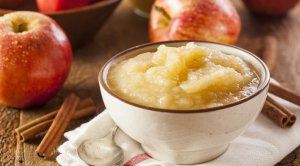
How to prepare it:
- Peel and cut an apple into small pieces. Wash them off.
- Now in a bowl, take fresh water, put this sliced apple into it and keep it in low heated flame.
- Boil them till they become soft so that they can be completely mashed.
- Once done, let it be cool. Now, serve it to your baby.
5. Rice Cereal
Rice is an easily digestible grain and should be included in the food chart for 6 month old baby.
This is again considered by most of mothers as their baby’s first grain food. Rice should be offered as solid foods first to avoid allergies.
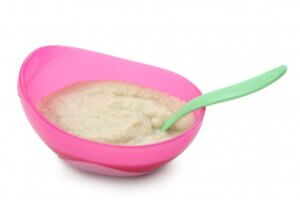
Ingredients:
- Brown Rice Powder (Grind rice powder well in a blender) (2 tablespoons)
- Water (1/2 cup)
- Breast Milk / Formula Milk
How to prepare it:
- Take 1/2 cup water and let it boil.
- Put Brown Rice Powder in boiling water and stir it gently so that the rice doesn’t stick to the pan.
- Stir it until it becomes thick and creamy in texture.
- Turn off the gas and let it cool down a little and add Breast Milk / Formula Milk when you offer it to your baby.
You can give your baby Fruits Puree in their first foods such as Apple Puree, Pear Puree, Banana Puree and Mango Puree. All these purees are regarded as the best Indian First Foods for a 6-month-old baby or the best 6-month baby food. Their Recipes are as follows:
6. Pureed Apple
You can give your baby fruits puree in their first foods such as Apple Puree, Pear Puree, Banana Puree and Mango Puree. All these purees are regarded as the best Indian First Foods for a 6-month-old baby or the best 6-month baby food. Simple apple puree can be added to food chart for 6 month old baby. Their recipes are as follows:
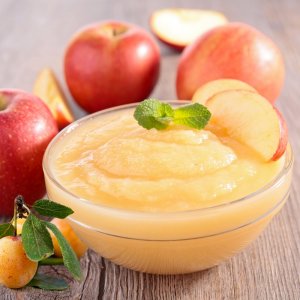
How to prepare it:
- Steam the apple for 10-15 mins.
- Take off the peel of the apple.
- Let it cool down
- Blend it in a blender.
- Pour it into a serving bowl.
7. Pureed Pear
Pear is another good baby food in India as it is a source of vitamins and minerals. Also, babies can easily digest it. They are easy solid foods for babies.
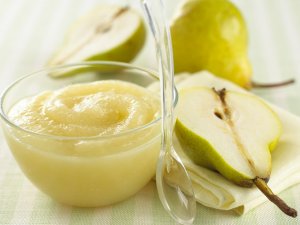
How to prepare it:
- Steam the pear for 10-15 mins.
- Take off the skin of the pear.
- Let it cool down.
- Blend it in a blender.
- Pour it into a serving bowl.
8. Pureed Banana
Bananas are the best choice when it comes to giving to your baby as their first food. It helps in controlling diarrhoea and treating constipation in babies. Simple banana puree can be added to the food chart for 6-month-old babies as it will strengthen their bone development.
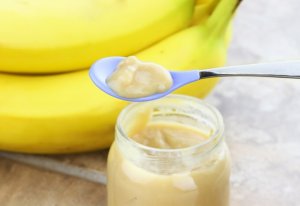
How to prepare it:
- Take off the skin of the Banana.
- Mash it nicely with a fork/spoon or you can blend it in a blender until it is smooth. Now, serve it to your baby.
- For extra creaminess, you can also add Breast Milk/ Formula Milk.
9. Pureed Mango
Mango helps in brain development, healthy eyes, better digestion and weight gain in babies. Include season mangoes in Indian baby food chart.
Read more: Best Foods for Weight Gain in Babies
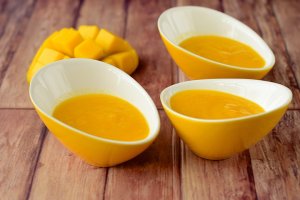
How to prepare it:
- Mash the mangoes nicely.
- Mash it with a fork/ spoon. Now, serve it to your baby.
You can also give your baby Vegetable Puree in their first foods such as Ghea Puree, Carrot Puree and Peas Puree. Vegetable purees are must-haves for the Indian baby food chart. Their Recipes are as follows:
10. Pureed Ghea (Bottlegourd)
Ghea or bottle gourd is the powerhouse of nutrients so it is considered a must-include recipe in a 6-month baby food chart.
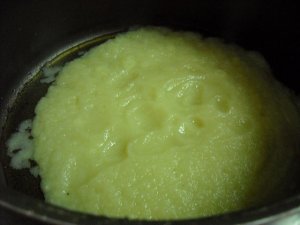
How to prepare it:
- Steam the ghee for 10-15 mins.
- Let it cool down.
- Blend it in a blender.
- Pour it into a serving bowl.
11. Pureed Carrot
Carrot is a good source of vitamins and minerals. It is also good for disturbed bowel movement hence it is a remedy to stop diarrhoea in babies. This is a great baby’s first food for a 4-6 month-old baby. Pureed vegetables like carrots are vital food chart for 6-month-old babies as they help improve vision development in babies.
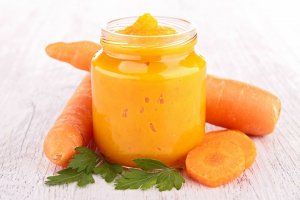
How to prepare it:
- Steam the carrot for 10-15 mins.
- Let it cool down.
- Blend it in a blender.
- Pour it into a serving bowl.
12. Pureed Peas
Although Peas look small, they are a powerhouse of nutrients. So, it is one of the best Indian First foods for a 6-month-old baby. Although it can cause gas in a baby, so be a little careful. And yes, always remember to go by the “3-day wait rule” for babies.
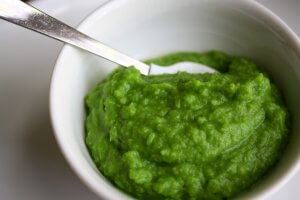
How to prepare it:
- Steam the peas for 10-15 mins.
- Let it cool down.
- Blend it in a blender.
- Pour it in a serving bowl.
13. Chawal Ka Pani (Rice Water)
Rice water is again one of the best baby food in india preferred for 6-month-old babies as it is a good source of essential nutrients. It can be given once during the daytime to babies as frequent consumption of rice water can lead to cough and cold as rice is cold in nature. It is also a remedy to stop diarrhoea in babies. Rice and rice water both are must-haves for the Indian baby food chart
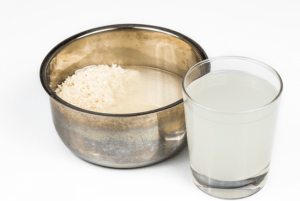
How to prepare it:
- Take ½ cup of uncooked rice and rinse it properly to remove impurities and dirt.
- Now soak the rice in water for 20-30 minutes.
- After soaking it, drain out the water and bring this rice to boil in 2 cups of water.
- Boil it till 20 minutes.
- Sieve the rice water in a soup.
- Turn off the gas and let it be cool. Once it gets lukewarm serve it to your baby.
14. Mixed Vegetable Soup
Mixed vegetable soup is supposed to be given to your 6-month-old in the third week of the 6th month. Its ingredients include a potato, peas, and a carrot.
Oil all the vegetables and then put them in a blender to blend and then serve to the baby.
Ingredients:
- Potato
- Peas
- Carrot
How to prepare it:
- Boil the Veggies in water.
- Let it cool down.
- Blend all the veggies together.
- Sieve it and serve it to your baby.
15. Sweet Pumpkin Puree
Sweet pumpkin is a good source of Vitamin C, iron and other essential nutrients. Due to its sweet and soft texture, it’s a good choice for babies and can be easily added to the Indian baby food chart.
Ingredients:
- ¼ sweet pumpkin
- Water
How to prepare it:
- Dice the pumpkin into small cubes after deseeding them and removing the pulp
- Boil around 2 cups of water
- Add the water and cubes of pumpkin in a blender and blend them until it comes down to a fine taste.
16. Avocado Puree:
Avocado is an excellent food for your baby, and it can be introduced as early as 4 to 6 months of age. Fruit purees with healthy fats like avocado are must-haves for the Indian baby food chart.
How to Make Avocado Puree for Babies: This puree can be made with half a ripe avocado. Cut and scoop out the avocado’s contents. Mash it well with a fork or blend it thoroughly in a blender. Check for lumps.
Nutritional Advantages: Avocado contains essential nutrients for the baby’s brain and central nervous system development. It is also high in fibre. It also has anti-inflammatory and anti-microbial properties, which help to keep infections at bay.
17. Pureed Sweet Potatoes:
Because of their sweet flavour, sweet potatoes are easier to introduce to your baby than other vegetables as solid foods. As a result, pureed sweet potato is an excellent choice for Stage 1 foods.
How to Make Pureed Sweet Potatoes for Babies: Peeled sweet potato, cut into small cubes (about half-inch). In a pot, bring water to a boil and add the cubes. Reduce the heat to a low setting and continue to cook until the pieces are tender. This will take approximately 15 minutes. Place these sweet potato cubes in a food processor. Blend until completely smooth.
If you don’t have a food processor, mash it by hand with a fork or other utensil. To make the sweet potatoes a suitable consistency, you can also use milk (breast or formula).
Nutritional advantages: Sweet potatoes are high in nutrients. They contain a lot of vitamin A. They also contain vitamin C, potassium, fibre, and antioxidants.
18. Oatmeal Puree
Oatmeal is a complex carb and a healthy source of essential nutrients thus is a must-haves for the Indian baby food chart.
Ingredients:
Powdered Oats – 1 cup
Water
Breast milk or formula milk – as per requirement
Banana – 1/2
How To Prepare:
- Boil two cups of water in a pan.
- When the water begins to boil, slowly add the cup of oat powder while stirring constantly to prevent lumps from forming.
- Add 2 teaspoons of milk when the oats have finished cooking.
- To give the dish a good flavour, you can add the banana paste.
19. Potato Puree
Potato purees with carbs and essential nutrients like potassium should find a place in Indian baby food chart.
Ingredients:
Potato – 2
Breast milk/formula milk – as per requirement
How To Prepare:
Peel off the skin after washing and cut small pieces out of it.
Add the potato pieces and simmer for 1-2 whistles in a cooker with half full of water.
Use a spoon to mash the cooked potatoes after transferring them to a bowl.
Including breast or formula milk.
The delectable potato puree is ready to feed your baby.
20. Vegetable Puree
A healthy option to go with, when your kids are choosy or picky while having their first food.
Ingredients:
Carrot – ½
Beetroot – ½
Potato – ½
How To Prepare:
Cut all the vegetables into small pieces, along with a teaspoon of jeera put them into a pressure cooker and let them sit for 3 – 5 whistles. Grind them and give in the form of puree.
NOTE: These recipes are just an idea, you can make it in whichever way you want to.
Consider it a mini-6-month baby diet chart. Even if you’re looking for some other month’s diet chart, remember to follow the 3-day rule. If you notice that the baby is reacting to those foods, stop right away. Diarrhoea, vomiting, constipation, and consistent crying can be a sign. In that case, please consult a paediatrician.
What if your baby is allergic to some foods?
An allergic reaction can take the form of vomiting or constipation etc. which is a cause of concern. Stop the solid food you are giving if your baby shows these signs or signs of an allergic reaction, if still, these reactions persist, consult a doctor.
Food Safety Do’s and Don’ts:
- Don’t feed solid foods to your baby through a bottle as it can cause choking.
- Do Supervise while your child is eating is really essential
- Solid foods introduced directly from the jar will cause bacteria as it will transmit through your baby’s mouth to the spoon and ultimately to the jar
- Do discuss with your paediatrician about the possible risks of food allergies and monitor food allergies by introducing new foods slowly while seeing the reaction of each food in the baby’s body
Is your Baby Ready for the Transition?
Readiness for solid foods in children depends on their own rate of development. Some signs that can show that a baby is ready for the transition to solids are sitting up with minimal support, good head control, and the baby reaching out for food from other family members
If the baby is getting started with solids, foods with a soft texture like pureed meats or beans, poultry or cereals which are iron-fortified is recommended
Weaning from breastfeeding
A Baby’s developmental readiness should be seen before deciding if you should wean your baby to a bottle or cup. If a baby around 6-8 months old is seen, they drink liquids in small amounts if someone else holds the cup for them while older babies have the required coordination of drinking fluids by themselves from the cup. If your baby is under one year or 12 months old and you are not breastfeeding him wean from breast milk to iron-fortified milk for infants.
6 Months Baby Food Chart for Indians
The order in which solid foods are introduced is up to you. However, for babies who have been breastfed primarily, puréed meats, poultry, beans, and iron-fortified cereal is recommended as a first food, as they provide essential nutrients. It is not good to introduce multiple new single-ingredient foods at the same time.
| Timing | Food |
| Early morning (7:00 am- 7:30 am) | breast milk or formula milk |
| Breakfast (8:30-9:00 am) | breast milk or formula milk |
| Mid-morning (10:00- 10:30 am) | breast milk or formula milk |
| Lunch ( 1:00- 1:30 pm) | rice porridge with moong dal / any fruit puree |
| Evening ( 4:00 -4:30 pm) | Banana puree |
| Dinner ( 6:00-6:30 pm) | breast milk |
| Bedtime ( 7:15- 7:45 pm) | breast milk |
It is recommended by health professionals to continue breastfeeding after the introduction of solid foods for up to 12 months, then as desired by the mother and baby. Solid foods are a milestone for your child and should be celebrated. Children learn a healthy relationship with food when they are introduced to solid foods, and they establish a healthy eating style as a consequence. As a general rule, solid foods cannot be introduced before the four-month mark, after the sixth month you may consider giving your baby a little taste of solid food but it all depends on the infant. Carefully learn about Indian food for 6-month babies and take a step forward. You can always refer to the food chart for 6-month-old baby given above in the article.
During infancy, it is critical to establish a positive feeding relationship. It is crucial to pay attention to each spoon of food that you feed your baby because a small mistake can make life difficult for your little one. You should encourage your baby to touch the food in the dish or on the spoon. This will help create a strong relationship between the baby and the food. This suggests that the baby is trying to know about what that thing is and generating curiosity in his or her mind. It is also necessary to know the cues that your baby is done eating. Head-turning is a common cue among babies.
Conclusion – Wrapping Up Your Baby’s First Food Journey
Introducing solids to 6 month old baby in India is a big yet emotional milestone! And, it’s totally okay to take it slow. Every baby’s journey is different, so trust your intuition and follow what is best for your little one. Enjoy the giggles, the funny faces, and the sweet messes with these best homemade baby foods for 6 month old discussed in this blog. This is just the beginning of a lifetime of exploring flavors, sharing meals, and making memories around the table. Happy feeding!
FAQs on 6 Month Baby Food Plan
1. Which baby food is best for a six-month-old?
Cerelac, Sooji kheer, Daal ka Pani, Stewed apple, Rice cereal, Pureed apple, Pureed pear, Pureed banana, Pureed Mango, Pureed Ghea, Pureed carrot, pureed peas, chawal ka paani, Mixed vegetable soup, sweet pumpkin puree, Avocado puree and pureed sweet potatoes are some of the food items that are important parts of a food chart for a 6-month-old baby that is nutritious and healthy and will help the child with all the vitamins are proteins that they need.
2. What kinds of food can I feed my six-month-old?
To grow up healthy, strong, and intelligent, a food chart for a 6-month-old baby requires a daily supply of wholesome nourishment. Your baby requires more energy and nutrients than ever at around six months old since she is growing swiftly. Try blending, mashing, or soft-cooking, potato, yam, sweet potato, carrot, apple, or pear to start weaning your baby. You may also give the baby rice water and dal ka paani. This can be included in a 6 monthly baby food chart for Indians.
3. What foods should a six-month-old avoid eating?
Foods that can be avoided in Indian baby food chart for 6-month-old babies or in general could be too much salt or sugar, Nuts and peanuts some kids might be allergic to them. Children under the age of five shouldn’t be given whole nuts or peanuts since they can choke on them.
Before introducing nuts and peanuts, consult your GP or health visitor if your family has a history of allergies, including food allergies. On rare occasions, newborn botulism, a highly deadly condition, can result from bacteria found in honey that generate toxins in a baby’s intestines. Give honey to your child only after they have reached the age of one. Avoiding honey, which is a sugar, will also help prevent tooth decay.
4. How to make our kids get ready for solids?
In the beginning, let your toddler sample one food made from a single component. This enables you to determine whether your child has any food-related issues, such as food allergies. Between each new food, wait three to five days. Your youngster will soon be eating and savouring a variety of different foods, so don’t wait.
Cow milk products, eggs, fish, shellfish, tree nuts, peanuts, wheat, soy, and sesame are a few examples of solid foods that could cause allergies. Other cow’s milk products, such as yoghurt, can be introduced before your kid turns 12 months old, but drinking cow’s milk or fortified soy beverages is not advised until your child is older than 12 months. Discuss when and how to introduce foods containing peanuts safely with your kid’s doctor or nurse if your child suffers from severe eczema and/or an egg allergy.
It’s vital to serve your child foods that are the correct texture for his or her development because some foods can be choking dangers. Prepare foods that can be quickly dissolved with saliva and don’t need to be chewed to assist prevent choking. Encourage your infant to eat slowly by giving him or her modest meals. Always keep an eye on your youngster while they are eating.
5. Do’s and Don’ts of baby’s first food?
Food allergies, choking hazards, and the possibility of foodborne illness are among the food safety concerns for infants and toddlers. Consider the following safety advice:
Do bring up the possibility of food allergies with your paediatrician. One new meal should be introduced at a time, every few days, to give time to watch for allergic reactions. According to the most recent research, it is not necessary to wait longer than 4 to 6 months before introducing foods like eggs, dairy, soy, peanuts, and fish that could cause allergies. In fact, giving baby food containing peanuts as early as 4 to 6 months old may help to avoid developing a peanut allergy.
Don’t use a bottle to give solid foods to your infant. Contrary to common belief, adding cereal to a baby’s bottle won’t make them sleep through the night because it poses a choking threat. The following is a list of additional foods that are thought to constitute choking hazards.
Keep an eye on your kid when they’re eating. When introducing solid foods for the first time, babies should be able to sit up straight and face-front. By doing this, choking is less likely and swallowing is easy.
Instead of feeding straight from the food jar, put some food onto a different plate first. Feeding straight from the jar could compromise food safety because bacteria from your baby’s lips could get onto the spoon and then back into the meal.
6. What is the best solid food to start?
Babies may begin to chew at 6 months. Although they won’t have mastered this ability just yet, they are usually willing to get their hands dirty with some mushy, pureed foods, which will help them learn about flavour and texture. At this age, the objective is to pique your child’s curiosity and make them enthused about their food selections rather than to fill them up on full meals of solids.
In order to prevent the iron shortage and support their overall health, newborns have high iron requirements due to their rapid growth. Offer your baby iron-rich meals like infant cereal, well-cooked meat, chicken, mashed beans, and lentilsInfant oat, grain, or barley cereals spoon-fed to your baby while being blended with breastmilk or formula pumpkin puree pureed peas Pureed carrots chopped banana Avocado mash Pureed or mashed beans Lentils mashed or pureed
7. Which food is good for 6-month-old baby brain development?
Brain development food for 6 months baby includes iron-rich foods, broccoli, sweet potatoes, pumpkin seeds, and others.
8. How do I know if my baby is ready for solid food?
Look for signs like good head and neck control, which shows interest in food which includes watching you eat, reaching for food and losing the tongue-thrust reflex which is about not pushing food out of the mouth.
9. How often should I feed solids to a 6-month-old baby?
Start with once a day and offer just a few teaspoons of pureed or mashed food after a milk feed. Gradually increase to two meals as your baby gets used to solids.
10. What foods should I avoid giving to a 6-month-old baby?
Avoid honey as it can increase the risk of botulism, whole nuts as it can occur choking hazard, cow’s milk as a main drink, salt, sugar, and very spicy foods. Also, avoid processed foods high in sugar or salt.
11. Can I give rice cereal to a 6-month-old baby?
Yes, you can! Rice cereal is a common first food in India. Make sure it’s smooth, and properly cooked.
12. Can I give rice cereal to a 6-month-old baby?
It’s a normal act! Babies often need time to adjust to new tastes and textures. Try offering the same food again in a day or two, and keep mealtimes calm and positive.
13. Can I give rice cereal to a 6-month-old baby?
Try to introduce one allergenic food at a time (like peanuts, eggs, or wheat) in small amounts. Watch for any reactions such as rashes, vomiting, or breathing difficulties. Always consult your pediatrician if you have concerns.
Happy Parenting!
50+ Mother’s Day Wishes and Messages To Send To Your Mom | Indian Diet Chart for 8 Months Baby | First Birthday Party Themes For Baby Boys in India | Safe Period Calculator | Baby Boy Names With Meaning | Top Facebook Groups For Indian Moms | Symptoms of Baby Boy During Pregnancy | 10 Month Baby Food Chart | Home Remedies To Treat Gas In Babies | Fancy Dress Ideas For Girls | 9 Month Baby Food Chart | Easy To Play Games For Kids | How To Teach Kids To Share | Best Boating Places In Bangalore | Fancy Dress Ideas For Kids | Home Remedies For Baby Hair Removal | Importance of Games and Sports in Student’s Life | Letter to My Son on his 11th Birthday | Role of Social Class in Parenting
- 7 Month Baby Food Recipes - January 19, 2021
- 7 Months Old Baby Food Chart with Indian Recipes - January 19, 2021
- 9 Month Baby Food Chart - January 14, 2021
- 9 Month Baby Food Recipes - January 14, 2021
- 10 Month Baby Food Chart - January 14, 2021
- 8 Months Baby Food Chart for Indian - January 14, 2021
- 20 Best Indian 6-Month Baby Food - January 14, 2021
- Indian Food Chart Recipes for 8 Months old Baby - February 20, 2018
- Indian Diet Plan for 6 Months Old Baby - January 12, 2018

